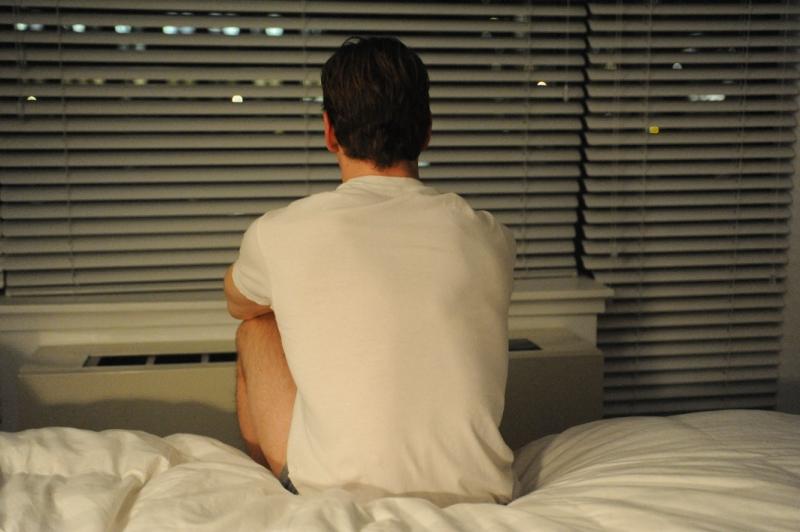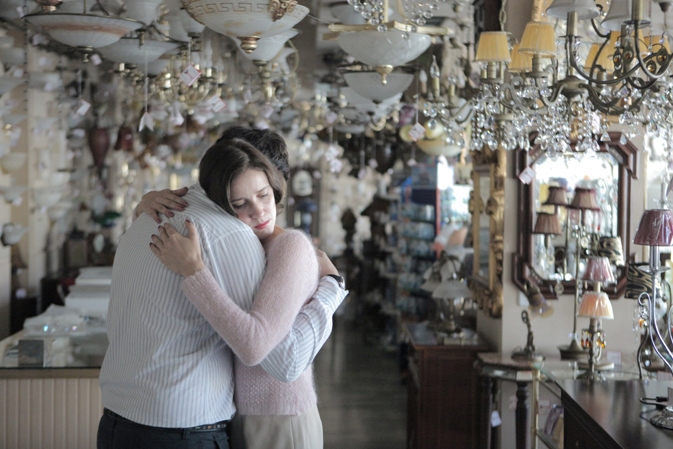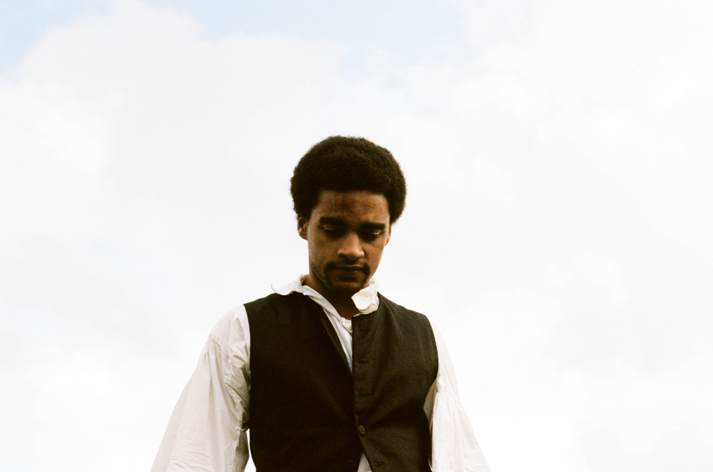theartsdesk at the Venice Film Festival: McQueen, Lanthimos, Arnold | reviews, news & interviews
theartsdesk at the Venice Film Festival: McQueen, Lanthimos, Arnold
theartsdesk at the Venice Film Festival: McQueen, Lanthimos, Arnold
The best work of newer, younger directors assessed

This year’s Venice Film Festival has been awash with great directors from what one might call the old guard: David Cronenberg, Roman Polanski, William Friedkin, Aleksander Sokurov, Philippe Garrel. But when the jury presents its prizes tonight, I hope that it honours some of the new, young film-makers who have been the ones to set this festival alight.
Chief amongst those has been a Brit, Steve McQueen, who follows his extraordinary debut, Hunger, with a second film that has shaken and stirred the critics here. The focus of Shame is Brandon (Michael Fassbender), a successful New Yorker whose ordered but emotionally desolate existence – dominated by his obsession with anonymous sex – is disrupted by the arrival of his sister (Carey Mulligan), a sometime club singer whose life is as chaotic as his is controlled and who, one suspects, holds the key to his own dysfunction.
They study the life and personality of a dead daughter, or wife, then call round each day and act them out
We have no idea what Brandon does in the midtown office he enters every day, except earn lots of money. We do know that he fills his nights with one-night stands, prostitutes and online porn, exchanges that hardly put a smile on his face, but which are the only ways he knows to connect. The presence of the needy and fragile “Sissy” will either nudge him towards normality, or push him further into his depraved abyss.
Visually the film is mesmerising, McQueen initially mirroring Brandon’s frozen soul in the glass and steel minimalism of his well-heeled milieu, then suggesting an increasingly inner torment through his nocturnal sorties downtown. Fassbender dominates the film; it’s impossible to take your eyes off him, and not just when he shows a commendable lack of inhibition in its raunchier scenes. For her part, Mulligan gives her best performance to date, and her rendition of "My Way", full of simmering hurt, is magical.
 Another, sadly rare film to take some chances here was also, coincidentally, a second feature. After the screening of Yorgos Lanthimos’s Alps, a friend said to me, “Fantastic – a director with a world view.” Lanthimos certainly has that; and it’s pretty bleak. His first film, Dogtooth, was a disturbing portrait of parenting, in which a couple imprisoned their children in a compound, educating and raising them to be strange automata. Here, a group of four friends calling themselves "The Alps" offer their services as “substitutes” to people who have just lost loved ones. It’s an odd sort of home help, as they study the life and personality of a dead daughter, or wife, then call round each day and act them out. It soon becomes clear that this role-playing is providing as important a function for The Alps as it does their customers.
Another, sadly rare film to take some chances here was also, coincidentally, a second feature. After the screening of Yorgos Lanthimos’s Alps, a friend said to me, “Fantastic – a director with a world view.” Lanthimos certainly has that; and it’s pretty bleak. His first film, Dogtooth, was a disturbing portrait of parenting, in which a couple imprisoned their children in a compound, educating and raising them to be strange automata. Here, a group of four friends calling themselves "The Alps" offer their services as “substitutes” to people who have just lost loved ones. It’s an odd sort of home help, as they study the life and personality of a dead daughter, or wife, then call round each day and act them out. It soon becomes clear that this role-playing is providing as important a function for The Alps as it does their customers.
This is an undoubtedly tough watch, with its stilted language, weird and often violent behaviour and bleak view of human relations. But in their perverse way Lanthimos and his brave actors do make one dwell upon the roles we all play within family and society.
 Another bold auteur is the director of Red Road and Fish Tank, Andrea Arnold; though her Wuthering Heights divided critics here. Arnold’s approach to Emily Brontë’s Gothic romance has been, first of all, to do away with the Gothic altogether; gone are Cathy’s ghost at the window and the demonic older Heathcliff, waiting for his own death. Instead, the director focuses on the pair as children, especially on the brutalised and brutalising childhood of Heathcliff. Her mode is hyper-realist, mixing non-actors (notably in the roles of the younger Heathcliff and Cathy, and older Heathcliff) with professionals, and eschewing music so that her soundtrack can perfectly evoke the windy violence of the Yorkshire moors.
Another bold auteur is the director of Red Road and Fish Tank, Andrea Arnold; though her Wuthering Heights divided critics here. Arnold’s approach to Emily Brontë’s Gothic romance has been, first of all, to do away with the Gothic altogether; gone are Cathy’s ghost at the window and the demonic older Heathcliff, waiting for his own death. Instead, the director focuses on the pair as children, especially on the brutalised and brutalising childhood of Heathcliff. Her mode is hyper-realist, mixing non-actors (notably in the roles of the younger Heathcliff and Cathy, and older Heathcliff) with professionals, and eschewing music so that her soundtrack can perfectly evoke the windy violence of the Yorkshire moors.
The presentation of this cruel, unforgiving landscape and thankless rural life is entirely convincing. The cinematography is breathtaking. The problem with the film, exacerbated by the bland acting (the casting is nowhere near as successful as in Fish Tank) and truncating of the story, is that the passion of the piece has all but disappeared.
But like Alps and Shame, Wuthering Heights embodies for me what is best about film festivals, which is to showcase directors who are prepared to experiment, go out on a limb, find new ways of telling stories. It would be fabulous if any one of these films wins a prize today.
AFTERWORD All three films featured in this review went on to win awards at the 68th Venice Film Festival. The full list is as follows:
Golden Lion for Best Film: Faust, dir Aleksander Sokurov (Russia)
Silver Lion for Best Director: Cai Shangjun, People Mountain, People Sea (China-Hong Kong)
Special Jury Prize: Terraferma, dir Emanuele Crialese (Italy-France)
Coppa Volpi for Best Actor: Michael Fassbender, Shame, dir Steve McQueen (UK)
Coppa Volpi for Best Actress: Deanie Yip, A Simple Life, dir Ann Hui (China-Hong Kong)
Osella Prize for Best Cinematography: Robbie Ryan, Wuthering Heights, dir Andrea Arnold (UK)
Osella Prize for Best Screenplay: Yorgos Lanthimos and Efthimis Filippou, Alps, dir Yorgos Lanthimos (Greece)
Marcello Mastroianni Award for Best Young Actor or Actress: Shota Somentani and Fumi Nikaido in Himizu, dir Sion Sono (Japan)
Share this article
The future of Arts Journalism
You can stop theartsdesk.com closing!
We urgently need financing to survive. Our fundraising drive has thus far raised £33,000 but we need to reach £100,000 or we will be forced to close. Please contribute here: https://gofund.me/c3f6033d
And if you can forward this information to anyone who might assist, we’d be grateful.

Subscribe to theartsdesk.com
Thank you for continuing to read our work on theartsdesk.com. For unlimited access to every article in its entirety, including our archive of more than 15,000 pieces, we're asking for £5 per month or £40 per year. We feel it's a very good deal, and hope you do too.
To take a subscription now simply click here.
And if you're looking for that extra gift for a friend or family member, why not treat them to a theartsdesk.com gift subscription?
more Film
 Brief History of a Family review - glossy Chinese psychological thriller feels shallow
Immaculately crafted family drama aimed at international art house audiences
Brief History of a Family review - glossy Chinese psychological thriller feels shallow
Immaculately crafted family drama aimed at international art house audiences
 Two Strangers Trying Not to Kill Each Other review - a portrait of photographer Joel Meyerowitz
Scenes from a seemingly picture-perfect marriage
Two Strangers Trying Not to Kill Each Other review - a portrait of photographer Joel Meyerowitz
Scenes from a seemingly picture-perfect marriage
 The Alto Knights review - double dose of De Niro doesn't hit the spot
Barry Levinson's Mafia saga drifts gently into the sunset
The Alto Knights review - double dose of De Niro doesn't hit the spot
Barry Levinson's Mafia saga drifts gently into the sunset
 theartsdesk Q&A: director François Ozon on 'When Autumn Falls'
The modern French master reflects on ageing, useful lies and country secrets in his new slow crime film
theartsdesk Q&A: director François Ozon on 'When Autumn Falls'
The modern French master reflects on ageing, useful lies and country secrets in his new slow crime film
 Santosh review - powerful study of prejudice and police corruption
Sandhya Suri tackles the caste divides and misogyny of Indian policing
Santosh review - powerful study of prejudice and police corruption
Sandhya Suri tackles the caste divides and misogyny of Indian policing
 Flow review - come the apocalypse, cue the animals
The Oscar-winning animated creature feature somehow doesn't work
Flow review - come the apocalypse, cue the animals
The Oscar-winning animated creature feature somehow doesn't work
 Opus review - the press trip from hell, starring John Malkovich and Ayo Edebiri
Mark Anthony Green directs a confusing commentary on celebrity culture
Opus review - the press trip from hell, starring John Malkovich and Ayo Edebiri
Mark Anthony Green directs a confusing commentary on celebrity culture
 theartsdesk Q&A: Indian star Radhika Apte on 'Sister Midnight'
The actor on her breakout screen performance capturing the frantic pulse of Mumbai, and living and working between London and India
theartsdesk Q&A: Indian star Radhika Apte on 'Sister Midnight'
The actor on her breakout screen performance capturing the frantic pulse of Mumbai, and living and working between London and India
 All Happy Families review - unhappy in their own way
Indie comedy-drama tackles toxic masculinity in the post-#MeToo era
All Happy Families review - unhappy in their own way
Indie comedy-drama tackles toxic masculinity in the post-#MeToo era
 Black Bag review - lies, spies and unpleasant surprises
Steven Soderbergh's spy drama is cool, cynical and sometimes very funny
Black Bag review - lies, spies and unpleasant surprises
Steven Soderbergh's spy drama is cool, cynical and sometimes very funny
 Sister Midnight review - the runaway bridegroom
Goats, vampirism and weird marriage in a madcap Mumbai
Sister Midnight review - the runaway bridegroom
Goats, vampirism and weird marriage in a madcap Mumbai
 theartsdesk Q&A: Raoul Peck, director of the documentary 'Ernest Cole: Lost and Found'
Peck analyses his approach to the anti-apartheid photographer's work and to his methods as a political filmmaker
theartsdesk Q&A: Raoul Peck, director of the documentary 'Ernest Cole: Lost and Found'
Peck analyses his approach to the anti-apartheid photographer's work and to his methods as a political filmmaker

Add comment